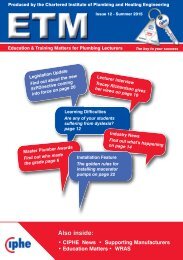Education & Training Matters
Aimed at Plumbing lecturers, published by the Chartered Institute of Plumbing and Heating Engineering.
Aimed at Plumbing lecturers, published by the Chartered Institute of Plumbing and Heating Engineering.
You also want an ePaper? Increase the reach of your titles
YUMPU automatically turns print PDFs into web optimized ePapers that Google loves.
LEARNING DIFFICULTIES<br />
JUST A WORD...<br />
What do you think Alexander Graham Bell,<br />
Winston Churchill, Leonardo da Vinci and<br />
Albert Einstein had in common? You might<br />
be surprised to learn that they all suffered<br />
from dyslexia.<br />
What we know...<br />
Around 10% of the population in the UK<br />
are dyslexic, with 4% being severely<br />
affected. It’s quite likely that some of your<br />
students (or even yourself) may have the<br />
condition.<br />
Dyslexia is a subject that has caused<br />
much debate over the years. The first<br />
descriptions – from over a hundred years<br />
ago – used the term ‘word blindness’,<br />
reflecting the view that difficulties in reading<br />
were caused by problems in visual<br />
perception. It was not until the 1970s that<br />
the role of language processing was<br />
recognised and only in the last 20 years it<br />
has been accepted as the primary feature<br />
of dyslexia.<br />
While controversy and debate continued,<br />
it was easier for some in professional<br />
practice to ignore the issue and harder to<br />
argue for specific approaches and<br />
Dysl xia<br />
e<br />
methods. Instead, those living with<br />
dyslexia were often wrongly labelled as<br />
‘slow’, ‘thick’ and/or ‘lazy’, with school<br />
reports warning parents not to expect<br />
much from their son/daughter!<br />
Interestingly, a fair number of plumbers<br />
are dyslexic. This is because dyslexics<br />
often enjoy and excel at solving puzzles –<br />
one of the traits that is a mark of a good<br />
plumber.<br />
How can you help?<br />
Unfortunately, dyslexia isn’t always picked<br />
up on by the time children leave secondary<br />
school. When they go on to further or<br />
higher education, their confidence can be<br />
low as they know they have a reading/<br />
writing problem and don’t know what can<br />
be done about it.<br />
The first thing to do if you suspect one of<br />
your students is dyslexic is to encourage<br />
them to be assessed. Unfortunately, these<br />
assessments, which are carried out by<br />
psychologists, are not funded by the NHS<br />
and can be expensive, costing hundreds of<br />
pounds. However, there are online screening<br />
tests, which cost between £30-£50.<br />
Colleges should have a Learning Support<br />
Department that can offer advice on this<br />
subject. They may offer Access Arrangements<br />
for dyslexic students, which will<br />
give them additional help in exams. To<br />
qualify for an Access Arrangement the<br />
student must have an assessment of their<br />
reading, writing and other skills that shows<br />
they have dyslexia.<br />
Help is also available for dyslexics in the<br />
form of computer software, including voice<br />
recognition and text to speech applications.<br />
Coloured overlays or question<br />
papers printed on coloured paper can be<br />
beneficial, as well as changing the colour<br />
of the font used.<br />
12 Summer 2015 ETM



